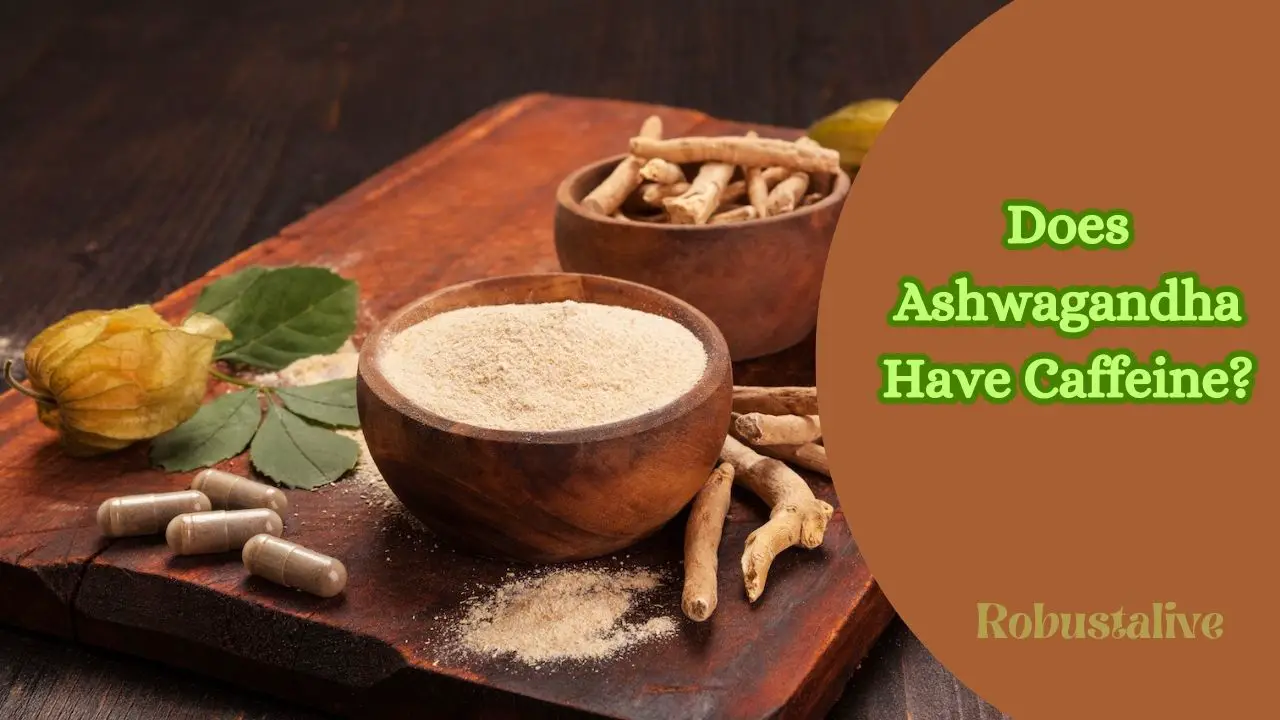Does Ashwagandha Have Caffeine? Find Out the Answers

Ashwagandha is an adaptogen that comes from the root of the Withania somnifera plant. This versatile herb has been used mostly in ayurvedic treatments since ancient times. Since caffeine keeps you refreshed and focused, does Ashwagandha have caffeine?
The answer is, it does not have any caffeine.
Ashwagandha is full of antioxidants and nutrients. Moreover, it contains amino acids. All these elements in this herb help to relieve stress, improve energy and stamina, balance hormones and mood, and help you relax and sleep better. Those who are sensitive to caffeine can make it an ideal option, as it is naturally caffeine-free.
If you have caffeine sensitivity but crave something to drink that keeps you refreshed, relaxed, and focused, keep reading to learn about why it can be a substitute for caffeine. Also, explore its benefits and the secrets behind its effectiveness.
Can Ashwagandha Be Used As A Substitute for Caffeine?
Ashwagandha can be a good substitute for caffeine in some cases. While the body reduces cortisol levels, the herb can boost energy immediately. That results in lasting stamina throughout the day, as caffeine does.
You can use it as a natural alternative to caffeine if you are sensitive to caffeine. Also, those who are looking for a more sustained energy boost without jitteriness can try ashwagandha tea.
Can Ashwagandha Be Combined with Caffeine?
Combining ashwagandha and caffeine helps counteract some of the negative side effects of caffeine. According to the National Library of Medicine, caffeine triggers people’s anxiety, especially those who have panic attacks.
On the other hand, ashwagandha, as an adaptogen, reduces stress levels by improving cognitive function. When caffeine mixes with this, the herb improves cognitive function and balances anxiety. Nevertheless, it is not a stimulant like caffeine. Moreover, it does not boost energy like caffeine.
Benefits of Combining Ashwagandha and Caffeine

Combining Ashwagandha and caffeine has so many beneficial sides. The combination of these two is also called a match made in heaven. Ashwagandha’s effects on caffeine sensitivity can cause many issues caused by caffeine.
So, let’s delve into the facts to know whether the name is worth it or not.
Reduced stress levels: Ashwagandha is an adaptogen that reduces stress levels. In fact, combining it with caffeine helps counteract the anxiety that caffeine induces.
Improved mental clarity and focus: Acetylcholine and dopamine are the neurotransmitters. They play a vital role in learning, memorizing, and attention. Certainly, Ashwagandha and caffeine both increase the level of these neurotransmitters. That is how they both improve cognitive function and combining them can alleviate these effects.
Increased energy and stamina: Caffeine is known for its energizing properties. Apart from boosting energy, it increases jitteriness. And combining it with Ashwagandha sustains energy without the jitteriness that caffeine alone causes.
Improved sleep quality: Triethylene glycol is a compound that is naturally found in Ashwagandha. Surprisingly, it triggers drowsiness and induces sleep. Again, it acts as a gamma-aminobutyric acid (GABA) mimetic. It promotes relaxation and improves sleep quality. GABA is a neurotransmitter that activates brain activity. And it also has a calming effect on the nervous system. That results in better sleep. Hence, it’s great news for those who consume caffeine but want to minimize its impact on sleep.
Enhanced mood: Ashwagandha has mood-enhancing properties. It balances the negative effects of caffeine on mood. Moreover, both control neurotransmitters like serotonin, dopamine, and GABA. In fact, both elements make you feel refreshed and put you in a good mood.
Synergistic effects: Combining both creates a synergistic effect. In general, the benefits of both are enhanced when taken together.
Improve fertility: Recent studies state that ashwagandha increases luteinizing hormone (LH) levels in women and testosterone levels in men. During ovulation, it stimulates egg production. Also, it improves sperm quality and overall fertility.
Good for breastfeeding: Overconsumption of caffeine can affect nursing babies. Certainly, caffeine can pass into breast milk. As a result, it makes a baby irritable and wakeful. Moreover, high caffeine intake may cause fussiness, jitteriness, and poor sleep patterns in infants. But 2-3 cups of coffee are acceptable. If this can’t meet the cravings of a nursing mom, she can add herbs like ashwagandha. The good news is that adding a little bit of this herb is good for breastfeeding women. It increases breast milk production.
Different Ways to Take Ashwagandha And Caffeine Together
Ashwagandha can be consumed in tea, milk, powder, or pill form. You may wonder knowing that you can mix caffeine and ashwagandha together. Here we are sharing some ways how to take both of them,
| Beverages | Making process |
| Mixing Ashwagandha powder with coffee | This is one of the most common ways to take both together. |
| Brewed tea | Ashwagandha and caffeine can be taken together in brewed tea form. |
| Powder mixed into smoothies: | You can mix it into smoothies. That is another way to consume it with caffeine. |
| Organic Ashwagandha Energy Drinks | Ashwagandha energy drinks contain a full clinical dose to work on stress, mood, and brain support. Plus, some companies offer organic food. |
| Ingesting Ashwagandha in pill form | It can also be taken in pill form. It is a convenient way to consume it with caffeine. |
What Are The Potential Side Effects of Taking High Doses of Ashwagandha with Caffeine?
Despite being a dynamic duo, taking high doses of Ashwagandha with caffeine increases the risk of side effects. Here are some of the side effects of Combining them:
Insomnia or difficulty sleeping
As we said before, ashwagandha contains sleeping properties, whereas adding too much caffeine to this can increase alertness and reduce fatigue, which consumes your usual sleep time.
Digestive issues
Ashwagandha can cause digestive issues such as nausea, stomach irritation, and diarrhea, especially if you take it in high doses. The main fact is that the root of this herp is basically oily, dense, starchy, and heavy. That makes you gassy, creating inflammation in the intestinal mucosa.
Muscle tension
Stress and anxiety can cause muscle tension. Yet it relaxes the body by reducing stress and anxiety. However, caffeine consumption sometimes causes muscle breakdown and exacerbates muscle tension.
Affects hyperthyroidism
Ashwagandha tea increases thyroid hormones, potentially causing hyperthyroidism. Caffeine intensifies symptoms, increases irritability, anxiety, and heart rate, and reduces L-thyroxine effectiveness. People with hyperthyroidism should avoid caffeine.
Effect pregnancy
Caffeine increases maternal catecholamine levels, causing fetal development issues and miscarriage risk. It also reduces blood flow to the placenta, affecting growth. Consuming ashwagandha can prevent these issues. Ashwagandha’s cortisol-lowering effects affect a developing fetus, which promotes healthy growth. Therefore, it is recommended to avoid consumption of this herb during pregnancy.
Worsens the condition of autoimmune disorder patients
The immune system remains overactive in people with autoimmune disorders. Ashwagandha stimulates the immune system. However, it can make the patient’s immune system even more active. And caffeine reduces the effect of medications for autoimmune disorders. Caffeine consumption increases the risk of developing rheumatoid arthritis and type 1 diabetes mellitus. Plus, it worsens symptoms of autoimmune disorders, such as inflammation, joint pain, and fatigue.
Ashwagandha vs. Caffeine at A Glance
Caffeine and ashwagandha are individual substances. Both have various physiological effects. The similarities encourage you to combine them to make healthy drinks, while the differences between them generally indicate that the herb is caffeine-free.
Here we are mentioning some Ashwagandha and caffeine similarities and differences for your convenience.
Dissimilarities
- The herb is an adaptogenic herb. It helps reduce stress and anxiety. On the contrary, caffeine is a stimulant that makes you energetic.
- Caffeine increases the release of cortisol. Ashwagandha decreases cortisol levels in the body to maintain homeostasis via hypothalamic-pituitary-adrenal (HPA) axis activity.
Similarities
- Both show positive health benefits like reduced stress levels, improved mental clarity and focus, increased energy and stamina, and improved sleep quality.
- Help combat stress by reducing cortisol.
- The herb boosts energy immediately and maintains stamina throughout the day. Whereas caffeine produces a burst of energy that also lasts for hours.
Click the link, if you are interested to know about Coffee Caffeine vs Green Tea: Which is Better for Health?
Frequently Asked Questions (FAQs)
How much ashwagandha should be taken with caffeine for optimal benefits?
The optimal dosage of ashwagandha depends on various factors, such as the type of the herb, how it’s prepared, whether it’s pure or combined with other synergistic herbs, the person’s size, state of health, digestive health, and health goals.
Is it OK to take Ashwagandha every day?
Although you can take 1 cup daily, take a break after drinking ashwagandha tea for six consecutive months. According to experts, continuous consumption of this has several side effects.
What Is The Recommended Dosage of Ashwagandha When taken with caffeine?
The recommended dosage of Ashwagandha with caffeine basically depends on individual needs and preferences. You can take 300 mg twice daily (once in the morning and once in the evening) for a total of 600 mg of the herb. For the average user, the minimum dosage of 250mg of Ashwagandha is fine. But it can go all the way up to 5g daily, depending on the health benefit and your tolerance of the herb.
Conclusion
To sum up the discussion about the question “Does Ashwagandha have caffeine?”, it is clear that it is a natural caffeine-free supplement, but it can go well with caffeine. They complement each other’s effects. So to balance the effects and meet the craving for caffeine you can drink ashwagandha tea with added caffeine.





